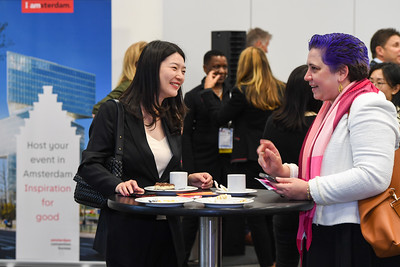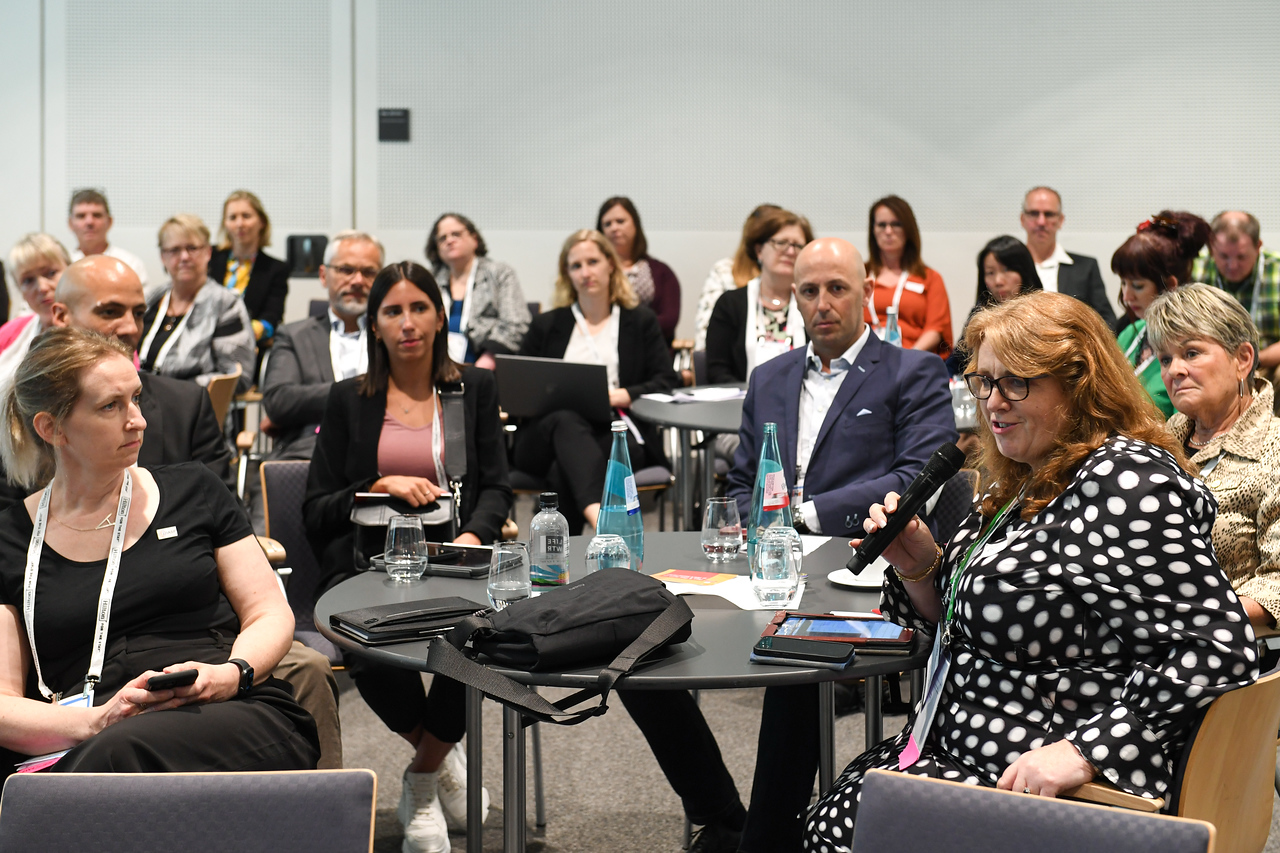The attendees were representatives of numerous associations from across the globe, as well as several members of the Boardroom team.
After a brief introduction by some of IMEX’s organizers and sponsors, the opening plenary session began. The theme was ‘Sustainability – less talk, more action’.
“We’re very resource consumption heavy,” said moderator and #Meet4impact founder Genevieve Leclerc. “People need to take flights, trains, cars to come to us. We’ve got a problem. We need to deal with it. There’s an elephant in the room, and we’re going to be tackling that elephant now.”
Explaining part of her organisation’s strategy Anne-Laure Leuba, Specialty Congresses team Manager, European Society of Cardiology, said, “We encourage our attendees to use public transportation, and we also partner with suppliers to prioritize sustainability. All the leftover food is given to an association for homeless people.”
The audience heard from Guy Bigwood, CEO of Global Destination Sustainability Movement, that some 70% of the CO2 impact of international events can be attributed to air travel, with that figure being around 40% for domestic events. He struck an optimistic note by suggesting that nascent technologies such as Direct Air Capture (DAC) – essentially huge filters that suck CO2 out of the air and convert it to a solid form than can be safely stored – might provide the means to offset the industry’s carbon footprint.
Head of Events with the Chartered Institute of Arbitrators, Nika Kurent, was more sceptical and took a hard line that the industry would by necessity have to shrink and work more locally and in virtual and hybrid forms.
Kai Hattendorf, UFI CEO, suggested that the stated goal should be to reduce carbon emissions by half by 2030, saying, “We need to make sure that the events industry is part of the solution of the current crisis, not another part of the problem. Because if we don’t move we will be seen as part of a problem. And then we’ll be regulated out of existence.”
Two parallel streams
The rest of the afternoon was broken into two parallel streams, with one set of discussions under the title of Association Meetings & Events held in the main Meridian conference room, with another series of talks on Association Leadership & Management in the Mistral conference room.
While one group attended a talk entitled ‘Association meetings and events experience design – how to create the wow factor!’ with speakers Sina Bünte, Hybrid and Digital Events Producer, IUCN, Brenda Sanderson, Executive Director, Interaction Design Association – IxDA, and Rodney Cox (Director of Flagship Events, International Gas Union), a second session moderated by Amy Hissrich, Vice President, International Affairs, ASAE, featuring a discussion with Coleen Eubanks, Chief Executive, International Association for the Study of Pain, and Margaret Walker, Executive Director, European Psychiatric Association, on the theme of ‘Mental health and wellbeing for associations.’ There was quite a degree of audience participation in this latter talk. The effect of the varying degrees of confinement and restrictions people endured during the pandemic came up during the discussion, with some attendees pointing out how it had broken down taboos when it came to speaking about mental health, while others explained how it obliged them to re-evaluate their personal and professional priorities. An impromptu poll via Slidoo showed that most attendees saw the resulting normalization of working from home (WFH) as a big plus in terms of overall wellbeing.
Ed Byers, Business Development, Canadian Society of Association Executives, moderated a discussion on ‘developing a robust commercial strategy for income generation and diversification’ with speakers Vicky Mant (Commercial Director, RenewableUK), Fran Rickenbach (Executive Director, National Association of Nephrology Technicians) and Kai Troll (Head of Development, International Sport and Culture Association, President, ASSOCIATIONWORLD).
Meanwhile the Mistral Room hosted a discussion on Diversity, Equity and Inclusion (DEI) with Lakisha Ann Woods (CAE, CEO, The American Institute of Architects and Chair of the ASAE Board) and Clark Massad (Vice President, Global Partnerships, International LGBTQ+ Travel Association). Rather than trying to convince people about the merits of DEI from a moral point of view, Lakisha Ann Woods said she preferred to “focus on the dollars and cents” saying embracing DEI is “not just the right thing to do, it’s a profitable thing to do. The more inclusive your workforce is, especially at the leadership level, the more innovative and therefore the more profitable.”

One of the final sessions was on the theme of ‘membership growth and retention to build a thriving association community’, moderated by Jakub Konysz, (Chair, ASAE International Associations Advisory Council, and Founder & CEO, Global Navigators) in which speakers Carola Van der Hoeff (President, AC Forum, Chief Operating Officer & Congress Director, FIP) and Iain Bitran (Executive Director, ISPIM) explored the behaviour and needs of association members.
Meanwhile the second discussion in the Meridian Room was on the effective use of Requests for Proposals (RFPs), moderated by Frances van Klaveren (Community Engagement Manager, ICCA) with input from Jenny Ennis (Congress & events Director, ESSKA), Agnes Maignien (Head of Marketing & Events, ICCA), and Genevieve Leclerc (Co-Founder and CEO, #Meet4impact). The main crux of this talk was the usefulness of constantly revising and adapting RFPs, at least on an annual basis, but ideally on an event-by-event basis, using feedback from previous events, as well as being clear on how an event aligns with the purpose of a given association. Genevieve Leclerc also outlined the importance of incorporating Sustainable Gevelopment Goals (SDGs) into RFPs, with a vision statement about the desired impact of an event.
After some closing remarks the events at Kap Europa drew to an end, with invited delegates decamping to the Marriot hotel for an evening of networking and reconnecting, while the unusually warm weather and occasional flashes of lightning served as a not so subtle reminder that any action that can be taken, professionally or personally, to slow down the speed of climate change and the mitigate severity of its effects, is worth taking.
